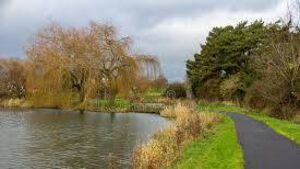Naas Lakes reed bed proposal 'has merit'

Naas Lakes
KILDARE County Council has reacted very favourably to a councillor’s suggestion of using a natural filtration system to deal with the growth of algae in the Naas lakes.
A couple of weeks ago ran the story of cllr Seamie Moore’s suggestion that the council consider using a reed bed filtration to counter the algal growth by “diverting the incoming element of the hospital lakes feeder river through an existing wetlands area”.
He suggested this in an effort to save the estimated €300,000 cost of dredging the lakes, which is overdue, having been last done 15 years ago.
“This would benefit the natural plant growth in the swampy area and drain the outfall of its nutrient enrichments that professionally acquired reports indicate are the reasons for the suffocating algae growth prevalent in the Lakes over the past several years,” he continued.
After having heard this, we put this proposal to the council executive, and the reply was very positive.
“The proposal has merit, as reed beds or integrated wetlands are commonly used for water treatment and purification,” said a council spokesperson.
“However, it is necessary to determine the extent of the area required and assess whether the ground levels on the site are suitable to accommodate a reed bed or wetland."
Curious, this reporter asked if it would mess with the diverse ecology in the locality.
“Kildare County Council will seek professional guidance from ecologists, the National Parks and Wildlife Services, and Inland Fisheries to ensure minimal disruption to the local ecology,” the council said.
The main cause for this algal growth is widely suspected to be from agricultural nutrient spreading in fields to the south of the feeder rivers, and we asked the council if it had any progress on narrowing down the suspect list.
“We have yet to identify the source of the nutrient enrichment of the water,” the council admitted.
“It could be attributed to domestic households, agriculture, commercial activities, or a combination of all three,” the spokesperson offered diplomatically.
Regarding the cost option of the alternative, the asked if the cllr Moore estimate of €300,000 to dredge the lakes was in the ballpark.
“The works have not been assessed, so there is no indication of the cost at this time,” said the spokesperson, who was equally non-committal with the evaluation of the tonnage that might have to be removed.
“We cannot adviaw on this matter until the works are assessed”.
The council said there was also no dedicated drainage site in mind until an assessment was carried out.





